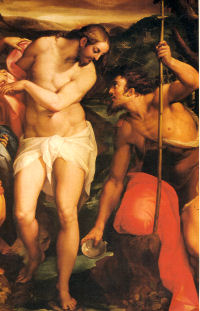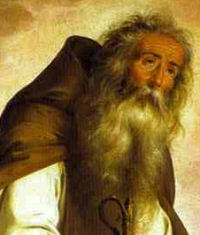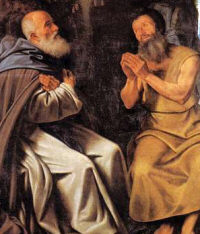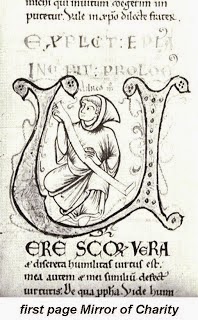Community Mass -Blessed and Cistercians, Feast-Anniversary of Fr. Cyprian Iwene Tansi: the only Nigerian blessed
Youtube
+++++++++++++++++++++
BLESSED CYPRIAN MICHAEL IWENE
TANSI (1903-1964)
|
|
At the age of 22, after several
years of working as catechist and school teacher, he entered the seminary and
was ordained a priest for the Onitsha diocese in 1937, when he was 34. As
parish priest he worked zealously in Eastern Nigeria for 13 years, selflessly
serving the religious and material needs of his people.
|
He had to travel on foot to visit his widely scattered
parishes, would spend whole days hearing confessions and was always available
to the people in their needs, day and night. He was particularly eager to give
young people a good preparation for marriage and to counteract the tradition of
"trial marriages" which prevailed among the pagans at that time. The
large Christian populations of many Igbo villages are a present witness to his
zeal.
However, in spite of all he was doing, he felt the call to serve
God in a more direct way in a life of contemplation and prayer and, if possible
to bring the contemplative monastic life to Nigeria. In 1950 his Bishop was
able to free him to try his vocation at Mount Saint Bernard Abbey, near
Nottingham, England, and to be trained in view of founding a contemplative
monastery in the diocese of Onitsha. His new name in the monastery was Father
Cyprian. The complete change of lifestyle, particularly living under obedience
when he had been a leader of people, the change of climate, food and most of
all the culture shock were severe tests, but he was convinced that this is
where God wanted him to be. Father Mark Ulogu, who later became Abbot of
Bamenda, joined him a year later.
In 1962 Mount Saint Bernard decided to make the foundation in
Africa, but for various reasons it was made in the neighbouring country of
Cameroon, near Bamenda, rather than in Nigeria. Although he was appointed as
Novice Master of the foundation, Father Cyprian was too sick to go. He died on
January 20, 1964, a few months after the departure of the founders.
The reputation for holiness that he had left in Nigeria before
going to Mount Saint Bernard never ceased to grow. After his death, many people
claimed to have received favours through his intercession. The process for his
beatification was opened in the diocese of Nottingham, then transferred in 1986
to the Archdiocese of Onitsha, whose Archbishop was the present Cardinal
Francis Arinze, who had been among the first children baptised by Father Tansi
when the latter was a young parish priest. On March 22, 1998, at Onitsha,
during a trip to Nigeria made for that very purpose, Pope John Paul II
beatified Father Cyprian Michael Tansi, proclaiming him to be a model of
priestly zeal and prayer.
Further references:
Fr.
Gregory Wareing, A
New Life of Father Cyprian Michael Iwene Tansi (Coalville,
Leicester LE6 3UL: Mt. St. Bernard Abbey. 1994). Father Gregory was Blessed
Cyprian's Novice Master.
Veronica
Onyedika Chidi Umegakwe, Footprints of Father Tansi: The
Tomb is not his Goal (Awhum,
Nigeria: Our Lady of Calvary Monastery, 1993). The life of Blessed Cyprian is
here presented in a five act play by the chief coordinator of the Father Tansi
Lay Contemplative Prayer Movement.
Elisabeth
Isichei, Entirely
for God. The life of Cyprian Michael Iwene Tansi (Kalamazoo:
Cistercian Studies Series 43, 1980 and 2000).
Dom
John Moakler, "Some Thoughts about Blessed Cyprian Tansi" in Hallel 25
(2000), pp.79-93.
See
also the Web Page on Blessed Cyprian Tansi, developed and managed by Father Chidi
Denis Isizoh, secretary of Cardinal Arinze at the Pontifical Council for
Dialogue with non Christian Religions www.afrikaworld.net/tansi/index.html
_______________________







 We mortals know that God can speak directly to our hearts, and actually has done so to many men in the past. We know that he can do directly all that is done by his Church, to whom he gave the power, with its teaching magisterium and sacraments. If he were to act in this way we should be open to continuous doubts about the source of our inspirations and the objectivity of the graces we thought we were receiving. It was to remove such doubts, and the possibility of self-deception that Christ left to us the external visible kingdom to which he gave all the powers necessary for men's salvation. It was for the security and peace of men's consciences that he set up a visible Church founded on the Apostles, men like ourselves, but transformed by his assisting grace.
We mortals know that God can speak directly to our hearts, and actually has done so to many men in the past. We know that he can do directly all that is done by his Church, to whom he gave the power, with its teaching magisterium and sacraments. If he were to act in this way we should be open to continuous doubts about the source of our inspirations and the objectivity of the graces we thought we were receiving. It was to remove such doubts, and the possibility of self-deception that Christ left to us the external visible kingdom to which he gave all the powers necessary for men's salvation. It was for the security and peace of men's consciences that he set up a visible Church founded on the Apostles, men like ourselves, but transformed by his assisting grace.



 St. Anthony lived in solitude for about twenty years. "His was a perfectly purified soul. No pain could annoy him, no pleasure bind him. In him was neither laughter nor sadness. The sight of the crowd did not trouble him, and the warm greetings of so many men did not move him. In a word, he was thoroughly immune to the vanities of the world, like a man unswervingly governed by reason, established in inner peace and harmony."
St. Anthony lived in solitude for about twenty years. "His was a perfectly purified soul. No pain could annoy him, no pleasure bind him. In him was neither laughter nor sadness. The sight of the crowd did not trouble him, and the warm greetings of so many men did not move him. In a word, he was thoroughly immune to the vanities of the world, like a man unswervingly governed by reason, established in inner peace and harmony."
.jpg)

